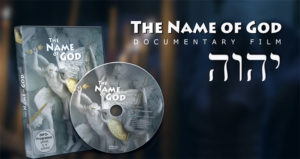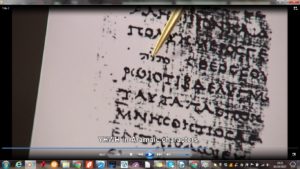
In this final article we wind up our look at Fritz Poppenberg’s Name of God documentary. I remind you, the film sets out its stall by observing that the thousands of gods in this world all have names, but in the Judaeo-Christian world God’s name is not used or known:
‘Since this prohibition has been persistent for about 2,000 years, and been broadly adopted by the churches of Christendom, a disturbing state has now been reached in which God’s name has almost been forgotten, and its pronunciation seems uncertain. This movie considers whether the concealment of God’s name is actually in harmony with Scripture and, furthermore, whether the correct pronunciation of the name can be found again.’(Emphasis added)
Two issues are addressed: 1) the concealment of God’s name, and 2) the pronunciation of God’s name. I have already addressed a third; 3) the question of this film’s ‘independence.’
As before, time is placed down the left side of the page to mark at which point in the film I have stopped to comment.
The Power of Inference
36:00
This section begins with the claim, ‘The name of God didn’t just vanish on its own in the course of time. There have always been forces that have actively pursued the elimination of the name.’ Even the Jews, we are informed, banned the name of their own God from approximately the second century after Christ. Uttering God’s name was punishable, we are told, and even Jews who became Christians observed the rule for fear of the Sanhedrin. The language is loaded, designed to evoke a sense of conspiracy; banned! fear! punishments! It is positively Orwellian. Of course, it might equally well be expressed as God’s name being ‘cherished’ because of a rightful fear of offending him by making it so commonplace it becomes a trope.
37:30
We are now going to encounter familiar Jehovah’s Witness arguments that we will have met on the doorstep. It is a world of inferences – must have, in all likelihood, probably – and guess work.
Jehova Jesu
Gerard Gertoux comments on the stoning of Stephen, the first church martyr, as told in Acts 7. Stephen is ‘accused of speaking against the Jewish faith and law.’ Gerard Gertoux takes up the story:
‘Stephen, a Jew, now wants to prove that he hasn’t disowned his Jewish Faith. He refers to the burning bush and in all likelihood mentions the name of God. But bringing up God’s name, while simultaneously being accused of blasphemy, results in a death penalty-and in this case it means execution by stoning.’
Here, then, is our first inference; ‘in all likelihood Stephen mentions the name of God.’ Here is the episode, as told in Acts 7, taken from the English Standard Version:
When Moses saw it (the burning bush), he was amazed at the sight, and as he drew near to look, there came the vice of the LORD (kyrios). “I am the God theos) of your fathers, the God (theos) of Abraham and of Isaac and of Jacob.” And Moses trembled and did not dare to look.’ (Acts 7:31-32)
In the Greek of the Septuagint the name is not used, substituted as it was by kyrios, Lord. This can be seen from the text of their own Interlinear New Testament. Further, Stephen was not stoned for using the name, but for condemning the Jews for killing the prophets. This is what ‘enraged’ them. – Act 7: 51-54.

Ironically, later in the film, the point is pressed, in the 18th century, some translators started reintroducing the name of God into the Bible. Several examples are shown on-screen, all in German of course, including this, clearly the account of this episode from Acts 7 (right)
Can I read the words ‘Jehova Jesu’?
I cannot find what translation this is, and friends familiar with the language assure me it is poor German.
It rather works against the claims of Jehovah’s Witnesses, and against the claims of this film. Yet here Jesus is Jehovah. Indeed, it shows the reverse of the New World Translation, calling Jesus ‘Jehovah Jesus’ where the NWT has Lord Jesus, and using Kyrios (Lord) where the NWT uses Jehovah. I have written asking the film maker’s motives and reasoning.
39:44
Fouad-266
Because the name would have been found in the Hebrew Bible (Old Testament) New Testament writers copying Old Testament quotes, the film argues, would have ‘probably’ come across the name and used it. Here is our second inference, ‘probably.’ But the name had been replaced with kyrios in the Septuagint, the Greek translation of the Hebrew Bible, and the New Testament writers followed suit. The film claims to destroy this argument in light of a papyrus fragment of the Septuagint found in Egypt in 1944, named Fouad-266. In this fragment we find the tetragram, YHWH, in Aramaic. The textual scholar, Robert H Countess, in his study of this issue comments:
The NWT translators have inferred from Papyrus Fouad 266 that which supports their prejudice: to wit, that the presence of the hebraically written tetragrammaton on a manuscript fragment justifies the assumption that the original manuscripts were written in the same manner. A fragment or fragments do not a corpus make.’ (Introduction, A Critical Examination of the New World Translation of the Christian Greek Scriptures)
 What is enlightening is the insight we get when we look at the fragment closely (left). Whilst the four characters of the tetragram are found in the fragment, there is ample space for the six letters of kyrios. This is because a copyist copied across, letter for letter, space for space, and checked his copying by counting letters and spaces down and across the manuscript, ensuring everything was inline as in the original.
What is enlightening is the insight we get when we look at the fragment closely (left). Whilst the four characters of the tetragram are found in the fragment, there is ample space for the six letters of kyrios. This is because a copyist copied across, letter for letter, space for space, and checked his copying by counting letters and spaces down and across the manuscript, ensuring everything was inline as in the original.
In other words, the manuscript from which he copied must have used kyrios. If there is space for six letters, the space was copied across, so the manuscript from which this is copied had kyrios. Knowing it was YHWH in the Hebrew, he inserted the four characters where the six Greek letters would have been. This is a recension, a critical revision towards the Hebrew text. But it is important to realise there are no extant copies of any New Testament manuscript containing the name.
Rolf Furuli concludes, ‘As a matter of fact, all the fragments of the Septuagint up to the year 50CE have God’s name either in Aramaic script, in old Hebrew script, or as the Greek phonetic translation of IAO. So the argument that the New Testament writers used kyrios, because the Septuagint translators did so, is invalid.’
The commentary continues, ‘Even if the original Scriptures of the New Testament aren’t available nowadays, it can be assumed-after what has been said so far-that with certain probability, the name of God was used in it. Based in this assumption, some well known translators re-inserted the name of God in the New Testament.’
And here is inference number three, ‘…it can be assumed…’
But, from what we have seen so far-the fact that the name in Fouad 266 is a recension, the fact that no extant manuscripts of the New Testament carries the name-such an assumption seems presumptuous and self-serving.
42:20
Jesus and the Name
‘Just as Stephen probably called out God’s name, it is likely that Jesus also used the name of God-at least around his disciples.’ So continues the commentary.
Here is inference number four, ‘It is likely that Jesus also used the name of God…’ Note the qualification, ‘at least around his disciples.’ This will prove significant. Rolf Furuli insists:
‘Jesus and his disciples also held the name of God in high esteem. For example,’ he continues, ‘when Jesus taught his disciples to pray he said let your name be sanctified. And, in his own prayer to his Father, according to John 17, he says that he had made manifest God’s name for his followers.’
What does it mean to make God’s name known? John Walton, professor of Old Testament at Wheaton College explains:
‘The name of a deity [in ancient cultures] is more than simply a moniker by which he or she can be invoked. It is the god’s “existence”…When [Moses] asks what name he should give for the God of their fathers (Ex.3:13) he is not expressing ignorance of the identity of their ancestral deity. It is not unusual for a single deity to have many different epithets or titles…So Moses’ question concerns which identity of the deity is pertinent to the mission on which he is being sent…(Exodus 6:2-3)
God indicates that there were some names that had been manifest to the patriarchs, but that he had not yet acted in ways that would manifest the identity bound up in the name Yahweh. His statement does not suggest that the patriarchs had never been introduced to the name Yahweh, but that he had not fulfilled that role in their experience….In this sense, Yahweh was not presented as a name they had never heard before, but as a name representing a function that they had not as yet experienced.’ (Ancient Near Eastern Thought and the Old Testament. IVP, pp 92-93)
Rof Furuli seems to agree with this explanation, ‘[Jesus] had made God’s name manifest for his followers. Which means that he told them the fame and purpose and everything that God’s name included.’
God the Father
So what is the name of God in the New Testament? What is the role, the function of God bound up in his New Testament name? If we go back to the evidence of the Lord’s Prayer so confidently presented by Jehovah’s Witnesses we find Jesus revealing it ‘at least around his disciples.’
‘This, then, is how you should pray: Our Father (Gk. pater) in the heavens, let your name be sanctified…’ (Mt.6:9, NWT)
The resurrected Saviour instructed Mary Magdalene, ‘Go to my brothers and tell them, I am returning to my Father (Gk. pater) and your Father, to my God and your God.’ (Jn.20:17
Paul describes God as, ‘…the Father (Gk. pater) of all who believe.’ (Ro.4:11) He tells us, ‘You did not receive a spirit that makes you a slave again to fear, but you have received the Spirit of sonship. And by him we cry, “Abba (of Chaldean origin meaning father), Father (Gk. pater)” The Spirit himself testifies with our spirit that we are God’s children.’ (Ro.8:15-16)
48:55
Baal Revisited
Much is made again of the Akkadian root of the name Baal:
‘Millions of Christians pray, not to Jehovah, but to a Lord whose Akkadian translation is-Baal’
Dread consequences are drawn out for those Jews who, in the Bible, worshipped Baal, ‘…because they have filled this place with the blood of innocents, and have built the high places of Baal to burn their sons in the fire as burnt offerings to Baal, which I did not command or decree, nor did it come into my mind…’ (Jer.19:4-5)
To say this is a stretch, from calling God Lord, to slaughtering children, is an understatement. But the fact that ‘Lord’ may be translated ‘Baal‘ in the Akkadian is irrelevant. In the Welsh it is translated Arglwydd. The Welsh politician David Elis-Thomas has the title, Yr Arglwydd Elis-Thomas, Lord Elis-Thomas. Does this mean he is worshipped among the Western Celts? This is like saying that, because my name is Michael, there is a real danger of my being confused with an archangel of that same name. Jesus’ name in Hebrew is Yeshua-in English ‘Joshua.’ How many Joshua’s are running around today, and how often are they confused with the resurrected Yeshua of Nazareth?
Calling on the Wrong Name?
The Karaite Jewish scholar Nehemiah Gordon has written extensively about what he sees as a ‘conspiracy of silence’ and the film draws on his claims to come to a dreadful and cruel conclusion about those who call on the wrong name:
‘I had a terrifying thought,’ writes Gordon. ‘Was God not answering our prayers, because we weren’t praying using His name?’ (Shattering the Conspiracy of Silence, 2013, Hilkiah Press)
As the ‘documentary’ draws to its close, this thought is offered up against a filmic background of Auschwitz. It is breathtakingly callous, cruel, and heartless, suggesting the suffering endured was the result of using the wrong name. It also represents a view that turns God’s name into nothing more than an incantation, an occultic rather than a Judeo/Christian idea. Surely, using God’s name in this formulaic manner is much closer to Baal worship than ever would be calling him Lord. Yet they press on with this idea as the film marks out one people group for their having used God’s name, and the apparent blessings that came as a consequence:
‘How accurate this question regarding God and His name really is, is proven by the thousands that have called upon and praised God’s name from Auschwitz and other concentration camps: the prisoners carrying the purple triangle, Jehovah’s Witnesses. Their religious conviction and their exemplary behaviour even move other prisoners to join them. When they were able to leave the camp in the end, not only had their number, but also their faith increased. Because their equipment was made of God’s Word, and Psalms like this one:
Jehovah is my light and my salvation.
Of whom shall I be in fear?
Jehovah is the stronghold of my life.
Of whom shall I be in dread?’
Conclusion
Ask yourself one simple question that has been addressed more than once in these articles; where is this film maker getting, where do Jehovah’s Witnesses get the material to develop these arguments? They draw upon long-established, thoughtful, well written material available in the public domain. There is no secret here. From singing Guide me O Thou Great Jehovah in church, as I did recently, through the clear explanations about the Name in any good Study Bible, to articles in commentaries, dictionaries, encyclopaedia, and endless resources on the web, this is well-trodden and familiar territory.
So why, asks the Jehovah’s Witness, don’t you simply write ‘Jehovah’ instead of ‘LORD?’
The historical pronunciation of the name was lost in the second temple period, 3rd to 2nd centuries BC, when its pronunciation was avoided in a misguided attempt to refrain from breaking the third commandment and using God’s name in vain (Ex.20:7). Jews devoutly refer to God as ‘the Name’ (ha Shem). They went beyond the Law and substituted Adonai in the text. This is what Jesus would have read in the synagogue. (Lk.4:16-20)
The Masoretes of the 12th century, it was, who added the vowel points of Adoni with the consonants of YHWH to give Yehowah. The derived form Jehovah appeared first in the 16th century. Reformation Bible translators brought it back into use, although there have been ongoing disputes about the pronunciation ever since, it having been lost over 2,000 years ago. The practice of using LORD and Lord is that old, but the only confusion is one of pronunciation, not one of identity.
Two Groups, Two Wrongs
So there are and have been two groups of people; those who understand this history and, respecting the long tradition of the Jews, use LORD, and Lord, and those who know this history and have decided the name should be restored to the text. Jehovah’s Witnesses belong in the second group.
Two wrongs are being done. The first is in placing in the text of the New Testament the name Jehovah where there is no warrant because manuscripts use the Greek kyrios, Lord. The second is in misrepresenting the first group as being part of some great conspiracy to have people forget God’s name.
Time and again this film states the obvious as though it is revelation, sees mystery where there is understanding, and suggests conspiracy where none exists.
Pointing out the obvious, the film’s commentary says there is no imperative in Scripture to substitute ‘LORD’ and ‘God’ for the name. But we know why the name fell into disuse, and we know why these substitutes replaced it. We know, when looking at the text in English, to whom these substitutes refer. This substitution didn’t seem to be a problem for Jesus, who didn’t pronounce the name in his lifetime. Further, he expressly instructs us to call God ‘Father’ (Mt.6:9 NWT) and we know God’s purposes in having us call him Father; that is, this best defines God’s role for and relationship with all believers today.
I hope you have found this series useful. If you have questions, or simply wish to share your own thoughts and reflections on this important issue, by all means do write to me at reachouttrust1@gmail.com
Note: If you wish to buy a copy of this film go to Drei Linden Films directly and translate the page to follow instructions for ordering. Drei Linden allowed me to pay on receipt.

